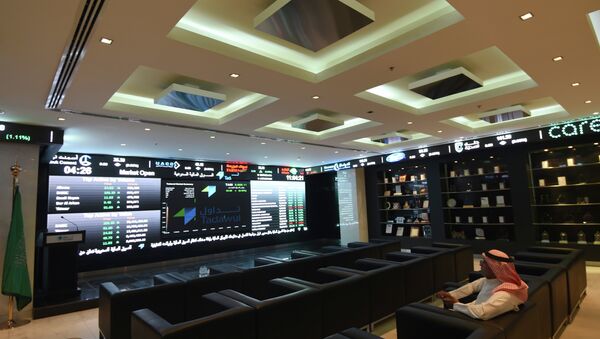Kristian Rouz – Stock markets in the Middle East retreated in Sunday’s trading due to the decline in global oil prices and subsequent expected declines in monetary liquidity inflows, further highlighted by the turbulence in the Saudi money market.
In Egypt, the EGX 30 Index dropped 3.2% at the close, its biggest retreat in a month and a half, to 7,625.76 points. Stock of Juhayna Food led the losses, slumping 7.5% after a governmental committee of investigators froze the assets of Juhayna chairman Safwan Thabet due to terrorism allegations.
The move spooked investors in Egypt, as most market participants are expecting a possible nationalization of Thabet’s stake in Juhayna.
However, the overall bearish market sentiment in Egypt can be attributed to the decline in oil prices, with the government’s involvement in the market only adding to the concern. Shares of Talaat Moustafa Group, controlling assets in agriculture, construction, manufacturing, and real estate, slumped 5.2%.
In Saudi Arabia, the Tadawul All Share Index lost 2.5% with the most prominent decline in construction sector, stirred by turbulence in the nation’s money market.
In Saudi Arabia, the Tadawul All Share Index lost 2.5%, with the most prominent decline in construction sector, stirred by turbulence in the nation’s money market. The Saudi government put to the market 20 bln riyals ($5.3 bln) worth of bonds last Tuesday, attempting to make up for the budget deficit, caused by the year-long decline in oil prices.
The nation’s financials are the biggest holders of governmental debt, and while the Saudi banks’ significant cash reserves allowed them to easily buyout all of the bonds’ issue at once, without any major depreciation, the liquidity market responded with only a cautious correction. Investors are concerned for the Saudi banks’ ability and/or willingness to buy multiple consecutive series of bond issues by the government in case the currently low oil prices will remain for another year or longer.
Saudi Arabia is currently OPEC’s largest oil exporter, with crude comprising some 90% the nation’s export revenue. While the price of Brent crude hit its multi-year lows at $49.03/bbl on Friday, the fiscal breakeven for Saudi Arabia is at $110/bbl, while the external breakeven is at $70/bbl, according to RBC Capital Market observations.
That said, Saudi Arabia is facing a significant liquidity starvation, meaning more bond issues could be expected soon. Market fundamentals are weak for Saudi Arabia as well, due to the structural peculiarities of the nation’s economy, while the oil price outlook remains negative.
In Kuwait, stocks dropped 0.6%, in Bahrain, the local stock index shed 0.2%. In Oman, the MSM30 Index dropped 0.4%, although the nation recently reported a major increase in oil production.
In Qatar, the QE Index lost 0.1% at the close after rising as much as 0.4% during the day due to the optimistic forecast on capital movements. Qatar’s two major enterprises, Ezdan Holding Group and The Commercial Bank QSC, are expected to attract some $138 mln in passive capital influx, while Qatar’s share in the MSCI Emerging Markets Index is poised to increase, according to a recent report by EFG-Hermes.
However, regional downward pressure outweighed Qatar’s positive developments, with local stocks ending up in the red.
Israel’s TA-25 Index bucked the trend, however, adding 0.4% to 1,719.09 points after the government approved the development of the Leviathan natural gas field, along with the overall increase of natural gas production. Subsequently, Delek Drilling and Avner Oil gained 1.5% and 0.8%, respectively. However, Israel’s growth slowed in Q2 to 0.3% year-on-year as exports underperformed.
Dubai’s DFM Index dropped to its lowest since late May, led by losses in the nation’s biggest real estate development enterprise, Arabtec Holding, down 5.4%, extending this year’s losses to 24%. In Abu Dhabi, the ADX General Index shed 1.3%.






